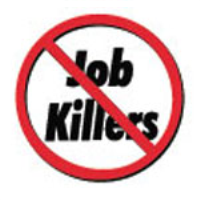Bogus “Job Killer” Bills Give Republicans and Corporate Democrats Something to Talk About

There are a lot of bills pending in the state Legislature at the moment and, as befits a government pretty much run by just Democrats, many concern health and welfare—minimum wage, sick leave, taxes, workers compensation, product defect protection and air quality violations, to name a few subjects.
The California Chamber of Commerce calls them “job killer” bills and released its annual list of the 27 most egregious affronts to common sense and oligarchy in a state where “economic recovery is still the number one issue.” Although encouraged that the list is shorter than in previous years, they are agitated by the danger at hand.
“These bills pose a serious threat to our economy and, if enacted, would dampen job growth in the state,” chamber President and CEO Allan Zaremberg says on the group’s website. Although the fear appears great, the risk appears less so. Last year, only one of the 38 bills singled out by the chamber made it to Democratic Governor Jerry Brown’s desk. He signed it.
The year before, the Democratically-controlled Legislature sent only six of 32 job killers to the governor. He vetoed two of them. In 2011, Brown vetoed four of the five bills sent him out of 30 proposed.
The first known use of the term “job killer” in a newspaper nationally may have been a 1922 Los Angeles Times headline about the wrong type of corporate boss: “Description of an Efficient Job Killer.” It has been evoked sporadically ever since in the service of various causes, but has in modern times become the epithet of choice by defenders of unfettered corporate and business activity.
A study (pdf) out of the University of Northern Iowa makes the case that the expression, at least since 1984, has been inappropriately applied. Analyzing 381 “job killer” stories that were published by the Washington Post, the New York Times, the Wall Street Journal and the Associated Press, the study concluded that fewer than 10% justified use of the term, which was often contained in a source’s quote.
The California chamber, which is a symbol as well as mouthpiece for business in the state, could not have enjoyed its success without help from Democrats. While the Dems stormed to a brief two-thirds supermajority in both houses, rather than parlay that advantage into a quick bolt to the left it opted for a drift to the center.
That’s the judgment of the Schwarzenegger Institute Report from the Price School of Public Policy at the University of Southern California which found polarization was reduced in both the Assembly and Senate between 2011 and 2013. “While both parties moved away from the extremes in the Assembly, most of the reduction in the ideological polarization gap occurs on the Democratic side,” the report said.
In the Senate, the closing gap was all due to the Dems. “Even though Senate Republicans moved rightward, many Democrats moved toward the center enough to offset the Republican rightward shift.”
That shift toward the “center” is, of course, a shift to the right in the bluest of blue states where Democrats aren’t under the same electoral pressure as in Congress or other states to compromise in that fashion. So why the give?
Gary Cohn at Capital & Main gives a tip of the hat to Corporate Democrats, who maintain their lefty cred on some social issues but fatten their campaign treasuries with money from corporate donors who would rather back a pliant winner than an ideological loser soul mate.
That money has been more available to Democrats since state voters made it harder to block passage of the budget with a minority vote, reducing the value of a Republican hostage-taker. A relatively new top-two primary system in the state also allows a diversity of Democratic candidates to compete against each other, giving greater entrée to the more corporate-inclined among them.
Sometimes, it simply inspires Republicans to run as Democrats. Cohn noted that former Republican Napa County Supervisor Bill Dodd is running as a Democrat for an Assembly seat and one-time Palmdale Republican Assemblyman Steve Fox is now one of the chamber’s favorite Democrats.
Fox’s website gives its largest promotion to business opportunities in California. “We’re pulling the party to the center, towards being more business friendly,” Fox told Cohn.
–Ken Broder
To Learn More:
Chamber of Commerce Targets "Job Killer" Bills (by Marc Lifsher, Los Angeles Times)
2014 Job Killer List (California Chamber of Commerce)
In Plain Sight: The Rise of Corporate Democrats in California (by Gary Cohn, Capital & Main)
“Job Killer” Bills Dead on Arrival (by Ken Broder, AllGov California)
- Top Stories
- Controversies
- Where is the Money Going?
- California and the Nation
- Appointments and Resignations
- Unusual News
- Latest News
- California Forbids U.S. Immigration Agents from Pretending to be Police
- California Lawmakers Urged to Strip “Self-Dealing” Tax Board of Its Duties
- Big Oil’s Grip on California
- Santa Cruz Police See Homeland Security Betrayal in Use of Gang Roundup as Cover for Immigration Raid
- Oil Companies Face Deadline to Stop Polluting California Groundwater





